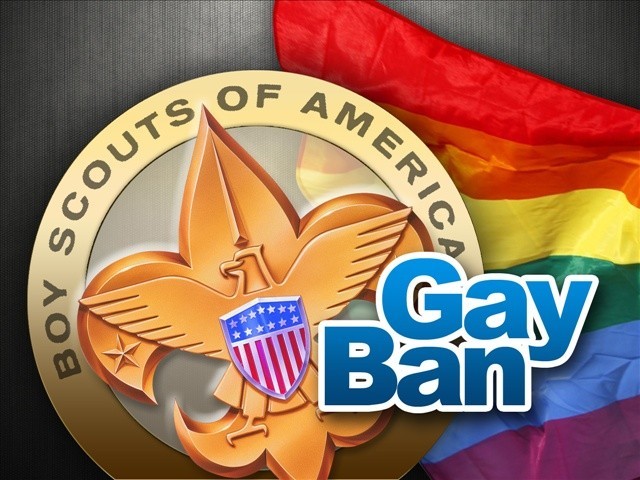"I can no longer maintain any connection to an organization which actively promotes such a bigoted and misguided policy," Dr. Robert Wise of Chicago wrote to Scout headquarters in Texas. "To that end, I am interested in removing all evidence that I was ever a Scout."
Wise, 59, is among several dozen former Eagle Scouts who have taken such steps following the July 17 announcement that the Boy Scouts of America, after a confidential two-year review, were sticking with the divisive, long-standing policy of excluding openly gay youth and adults as members and leaders.
Another of the protesters is attorney Jackson Cooper, 32, a former senior patrol leader of Troop 342 in his hometown of Louisville, Ky. In an open letter, he said he was unsure if any of his fellow Scouts were gay.
"But I do know that my now deceased mother, a lesbian, would not have been allowed to serve as a den mother if her orientation had been public knowledge," he wrote. "The thought that I have invested such a large part of my life with an organization that would have turned my own mother away breaks my heart."
Also returning his medal was Martin Cizmar, 31, arts and culture editor of Willamette Week, an alternative newspaper in Portland, Ore.
He tweeted the news: "Just mailed my Eagle Scout medal back to the BSA to protest the ban on gay scouts. Kinda sad, but important."
In a letter sent to BSA headquarters along with the medal, Cizmar detailed his scouting career with a troop in Tallmadge, Ohio.
"Though I did not know at the time, I was acquainted with a number of gay Scouts and Scouters (adult leaders)," he wrote. "They were all great men, loyal to the Scout Oath and motto and helpful to the movement. There is no fair reason they should not be allowed to participate in scouting."
Deron Smith, the Boy Scouts' national spokesman, said there was no official count at his office of how many medals had been returned. He also noted that about 50,000 of the medals are awarded each year.
"We're naturally disappointed when someone decides to return a medal because of this single policy," he said. "We respect their right to express their opinion."
Beyond the Eagle Scout protests, the Boy Scouts' reaffirmation of the no-gays policy has drawn condemnation from liberal advocacy groups, newspaper editorialists and others. In Washington state, Republican gubernatorial candidate Rob McKenna, an Eagle Scout, joined his Democratic opponent, Jay Inslee, in suggesting the policy be changed.
But overall there has been little evidence of any new form of outside pressure that might prompt the Scouts to reconsider.
The leadership of the Scouts' most influential religious partners - notably the Mormons, Roman Catholics and Southern Baptists - appears to support the policy. And even liberal politicians seem reluctant to press the issue amid a tense national election campaign.
For example, President Barack Obama has made no public statement thus far about the Scouts' policy - a notable void given that he is a staunch supporter of gay rights and also, like all presidents of the past 100 years, is the Boy Scouts' honorary president.
The American Civil Liberties Union, in its online newsletter, suggested that Obama re-evaluate White House ties to the Boy Scouts. The White House press office declined comment on the matter, and there has been little pressure on Obama from other quarters.
"People are reluctant to force him to take sides," said Richard Socarides, a former Clinton White House adviser on gay rights. "Everybody knows what side he's on anyway."
Rep. Barney Frank, an openly gay Democrat from Massachusetts, said Obama already had burnished his gay-rights credentials by supporting same-sex marriage and there were "bigger fish to fry" at this juncture.
In contrast to Obama, Republican candidate Mitt Romney does have a public position on the Scouts' policy - he politely disagrees with it.
Back in 1994, during a political debate in Massachusetts, Romney said this: "I support the right of the Boy Scouts of America to decide what it wants to do on that issue. I feel that all people should be able to participate in the Boy Scouts regardless of their sexual orientation."
A Romney spokeswoman, Andrea Saul, said in an e-mail that this remains Romney's position today.
Beyond the political arena, the Boy Scouts' stance was bemoaned in various newspaper editorials, ranging from The New York Times to the Iowa City Press-Citizen to the Salina Journal in Kansas.
"The Scouts do matter. They do a lot of good for a lot of families and boys," said the Journal's editorial. "But their influence and relevance will wane if they continue to go against a society that's becoming more inclusive, not exclusive."
Some critics of the ban say it endures because religious organizations sponsor about 70 percent of the Boy Scouts' units nationwide - and these church groups generally support the membership policy.

http://accesswdun.com/article/2012/8/251481
